Learning better in Côte d'Ivoire

Story highlights
- To improve learning, Côte d’Ivoire, with support from GPE, has been targeting efforts in 6 regions with the lowest learning results and the highest poverty rates.
- Interventions include expanding access to preschool, helping out-of-school children with catch up classes, training primary teachers, and bringing in community oversight through school management committees.
- Results are so promising that the government is expanding these initiatives to the whole country.

Improving learning
Since 2018, GPE has granted US$52.1 million to finance the Educational Services Improvement Project (PAPSE in French), implemented by the Ministry of Education and Literacy with the support of the World Bank.
The project covers six of the most disadvantaged regions of the country (Bagoué, Béré, Bounkani, Kabadougou, Poro and Tchologo) where the enrollment rates and the primary school completion rates are the lowest and the poverty level is the highest.
The project, which directly addresses the country's education sector plan objectives for the 2016-2025 period, aims to improve student learning in schools through several interventions:
- Increase the number of young children who have access to preschool
- Get out-of-school children back to school
- Train primary school teachers to use new teaching methods to improve learning in reading and math
- Increase citizen participation by creating school management committees in each school.
Increasing the number of preprimary classrooms
In Côte d'Ivoire, only 10% of children between the ages of 3 and 5 were enrolled in preschool in 2015–2016, and in rural areas, only 5%. The project supports Côte d’Ivoire’s two main strategies to expand the preschool offering: create community preprimary education centers for 4 and 5-year-old children in rural areas; and add a preprimary class in public schools to welcome 5-year-old children.
Since 2018, the project has financed the creation of 117 community preprimary classes and the training of teachers for these classes. This model relies on the strong commitment of communities who provide a space, choose a teacher, and pay their salary with the support of a grant from the State. Meanwhile, 134 preprimary classrooms have been built in public primary schools.
This new and expanded preschool offering makes it possible to welcome 30,000 young children and prepare them to learn better when they reach primary school.
The project also evaluated the 250 new preschool classes to ensure they comply with quality standards in terms of access, materials and equipment, teaching methods, infrastructure and governance. By the end of 2022, 98% of the classes evaluated complied with these standards.
Getting out-of-school children back to school
Over 2 million Ivorian children do not go to school, most of them because they were never enrolled in the education system and others because they left school early. “Bridge classes” enable children aged 9 to 14 to go through an accelerated learning program to bring them up to grade level so they can enroll in a public primary school.
Several non-profit organizations, such as École Pour Tous in Trypoungo, are working to set up these bridge classes.
Since the project started, 100 bridge classes have been established, making it possible for over 3,000 students to go to school. For the school year 2022–2023, another 1,700 children are set to benefit from this accelerated learning program.
Teaching reading and math better
The learning outcomes of children in Côte d’Ivoire were poor and lower than in other francophone countries in the region, as shown by the PASEC 2019 evaluation report.
To improve students’ reading, writing and math levels, the project provided new pedagogical materials: “decodable” reading handbooks and “decipherable” math handbooks for students; teaching guides and assessment tools for teachers in the first three grades; and observation checklists for school inspectors. Teachers have also been trained to use the new tools and methods.
Meet the teachers
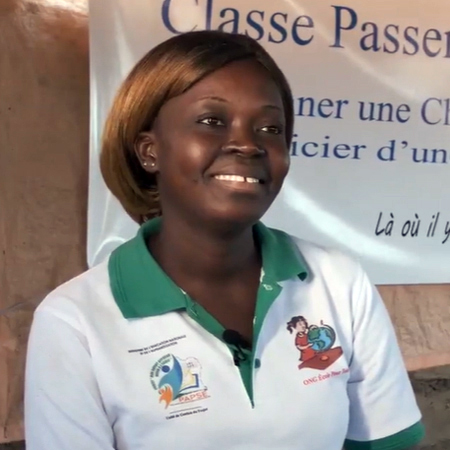
Foussiata Coulibaly
Teacher, Bridge classroom, Trypoungo
"I come from Korhogo, and this is my first year teaching here. I have 40 children in my class, between the ages of 9 and 14. These children used to work in the fields. None of them had been to school until now. Thanks to the project, we were able to get them into school; we will train them so they can get into formal education.
What is hardest at first is that the children do not understand French. But I understand their language and I have techniques to help them understand what I am saying.
I teach everything: math, reading, oral expression, singing and poetry. In the morning, we review the previous lesson. In math, I put them into groups so they can help each other. We do a lot of exercises so that I can evaluate their progress.
I decided to become a teacher because the community needs us. So many children do not go to school because there are no teachers in their village.
I enjoy my work and have a good relationship with the people in the village. I joke around with them. Sometimes parents come to see me and ask me how their children are doing. If a child is absent, I will go see the parents to understand what is going on. I have to convince them to send their child to school."
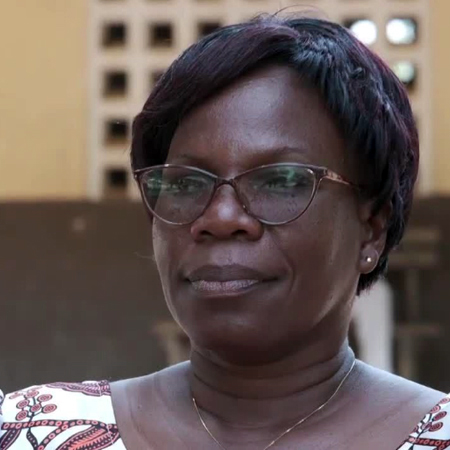
Rose Yabisio
Kindergarten teacher, Nambirghékaha Primary School
"I am a preschool teacher. I have been doing this job for 4 years. I chose to become a teacher because I believe I have to help children learn something in life. It's an exciting job in which I have been interested since I was very young.
This year, I have 19 students, 10 girls and 9 boys. I also have an assistant who helps me while I teach the lessons. I have a schedule for the week and a handbook that details all the lessons we are going to teach each day of the week.
I use pedagogical tools. For example, this morning we learned which objects to use to keep the house clean. I brought a bucket, soap, gloves and a mop. I taught those words to the children by showing them each object, and I asked some of them to show us how to use them while describing what they were doing.
I attended an initial three-month training course for preschool leads and assistants followed by another continuing education course for a month and a half. The training was very useful because it taught me self-control, not to get angry and to put myself at the same level as children to better understand and help them. When a child has a problem, they will automatically feel more comfortable and come to me to explain what is going on.
At first, this job was hard because I was in an area where children did not understand what I was saying. But after putting in the effort, I started seeing results and that made me happy. I was proud of myself because I saw I contributed to something.
And when the children see me, they come to me and give me hugs. That is the most beautiful gift!"
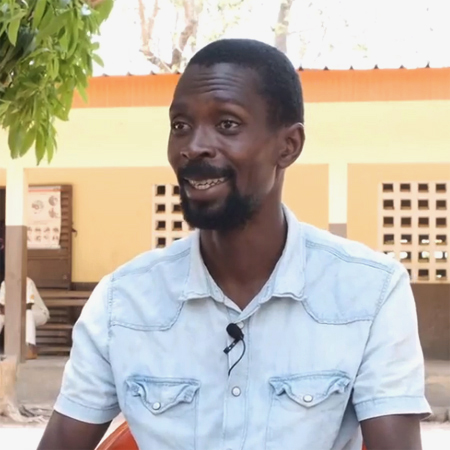
Souleymane Konate
Grade 2 teacher, Nambirghékaha Primary School
"I have been a teacher for 10 years, 9 of which were here in Nambirghékaha.
I was trained in 2019 and 2020 on how to use the teaching materials available to us.
Before, all the class posters were simply used for decoration. With the Educational Services Improvement Project, we were shown how to use the teaching materials and how to get children to be interested in their lessons. And, more importantly, we learned how to keep things simple while giving children a quality education.
When I was learning to be a teacher, I was taught the skills-based approach to teaching, which is the most common teaching method in Côte d’Ivoire. But with the project, we do things differently. While playing, children get to handle objects and learn at the same time. It is much easier for them.
And we also use questioning, the “why” and the “how”: “How did you figure this out? Why do you say it’s this way?”
Here is a simple example: with the skills-based approach, a Grade 2 student learns to count to 20, but with the new method, the child can count to 100. The difference is astonishing. In six months, a Grade 2 student can count to 500. I did it this morning. This teaching method has a much bigger impact on the life of children."
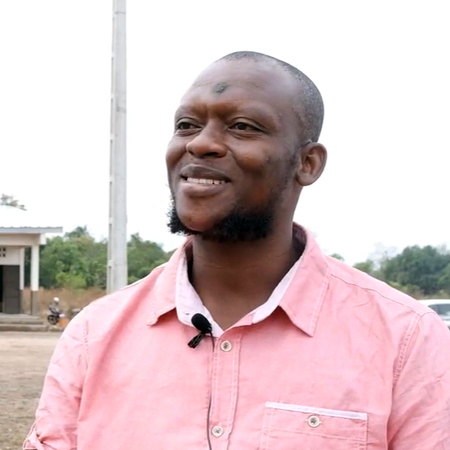
Diaby Issouf
Principal, Bengo Primary School
"I have been the principal for six years. We have three teachers and 50 students.
Thanks to the project, after this year’s assessments, we are now ranked 1st at the national level. Last year we ranked 3rd. I am happy because we worked hard.
And with the new school now built, we can offer students better learning conditions. These positive results come from all the hard work teachers put in, as well as the project’s different teaching approaches. But we also provided a lot of support: there is a mandatory hour and a half study hall every night of the week.
There is no electricity in the school and the space is small. In the evening we use torches. In better conditions, we could do better.
Once students finish primary school, we hope they will go to junior high school. It is important for parents to stay on top of their children’s educational progress."
The project includes a research component to assess the impact of the interventions. Because the targeted regions were those where the school results were the lowest, the first evaluations show that significant challenges remain before all children can read and count.
But the impact of the project is already evident when comparing the schools that have received its support with those that have not.
In supported schools, Grade 3 students have an average reading score of 29 out of 100 compared to 18 out of 100 in the schools of the control group, and the supported schools have half as many students unable to read a single word.
In mathematics, the performance of Grade 3 students in supported schools is also higher (56 out of 100 against 44 out of 100 in control schools).
These results are promising and they have been trending upward since 2020, both in mathematics and in reading. An increasing number of students are reaching the minimum proficiency levels.
This is even more remarkable since the 2020–2021 school year was shortened due to the COVID-19 pandemic.
Involving communities in school management
The implementation of school management committees (COGES) in the 375 schools targeted by the project was a significant action to ensure that schools function properly and that students receive quality education.
These committees received training as well as grants based on the school’s needs to carry out improvement activities.
Meet the community members
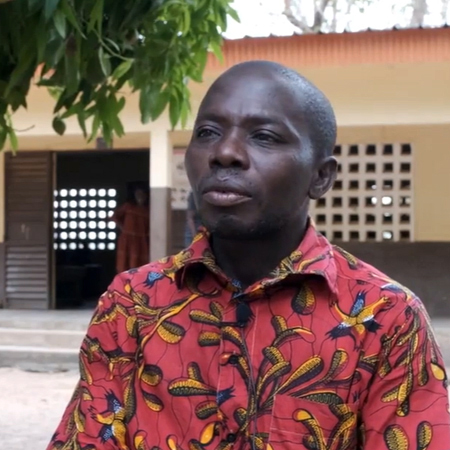
Foligolo Yéo
President of the School Management Committee, Nambirghékaha Primary School
"The people of the village elected me for a two-year term. This is my first year in this role. I am happy to be the president of the School Management Committee because it allows me to stay abreast of what is going on at the school.
If there is a need, they call me. I speak to teachers and organize regular meetings with parents, sometimes twice a week.
For example, we pushed to have two preschool classes opened at the school. Now the young children of the village can go to preschool.
When work needs to be done at the school, the whole community participates. We mobilized everyone for one day to build a fence around the school."
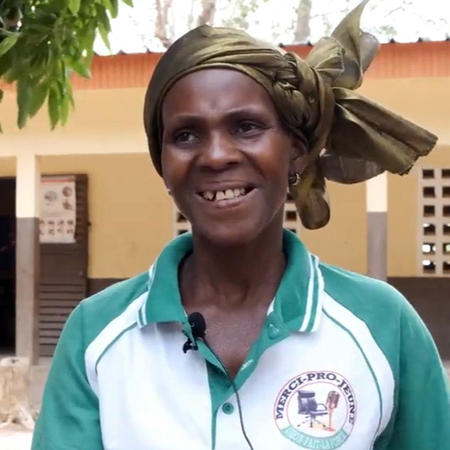
Katiene Songhi Ouattara
President of the Women’s Community, Nambirghékaha
"As president of the Women’s Community, I take care of many things at school; for example, I organize the school cafeteria or do the cleaning when needed. I have four children who attend this school. I was not able to go to school myself and I hope my children will do better than me."
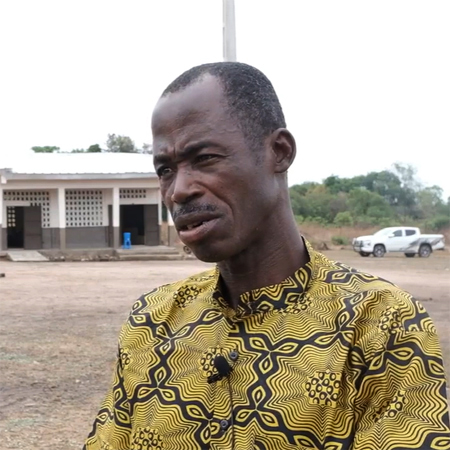
Moussa Koné
President of the School Management Committee, Bengo Primary School
"Before, the school in Bengo was built with local materials and not very solid. But thanks to the project, we were able to have a new school built with three classrooms.
I work with the parents. If a student does not come to school regularly, I meet the parents and resolve the situation with them. If the school needs something, they call me and I help. I hope that through education, my children will become “someone” and have an easier life than mine."
School dashboards enable close and direct monitoring by the communities. This system promotes teacher attendance, improves the school environment (by flagging any small renovations and improvements that need to be done), and enables direct feedback to the central education system on school performance and other topics linked to school management.
Parents have a vested interest in making sure their children benefit from all aspects of attending school and feel involved in their children’s school life.
All management committees under the project have organized regular meetings to report on their activities, including how they used the grants they received and the students’ learning outcomes.

Expanding the program across the country
In view of the positive results obtained by PAPSE, the program piloted in six regions is being scaled up across the entire country. The government’s effort, with an investment of more than $265 million, is matched by a joint program put in place in late 2022, which combines a $15 million GPE Multiplier grant and a $350 million credit by the World Bank.
Over the next five years, these funds will be disbursed according to a specific framework based on the results obtained by the country. This confirms the government’s belief in this program, which is in line with its national action plan for primary education.
This new program will enable over 66,000 teachers to be recruited and trained and over 8.4 million children in Côte d’Ivoire to have access to a better education.













